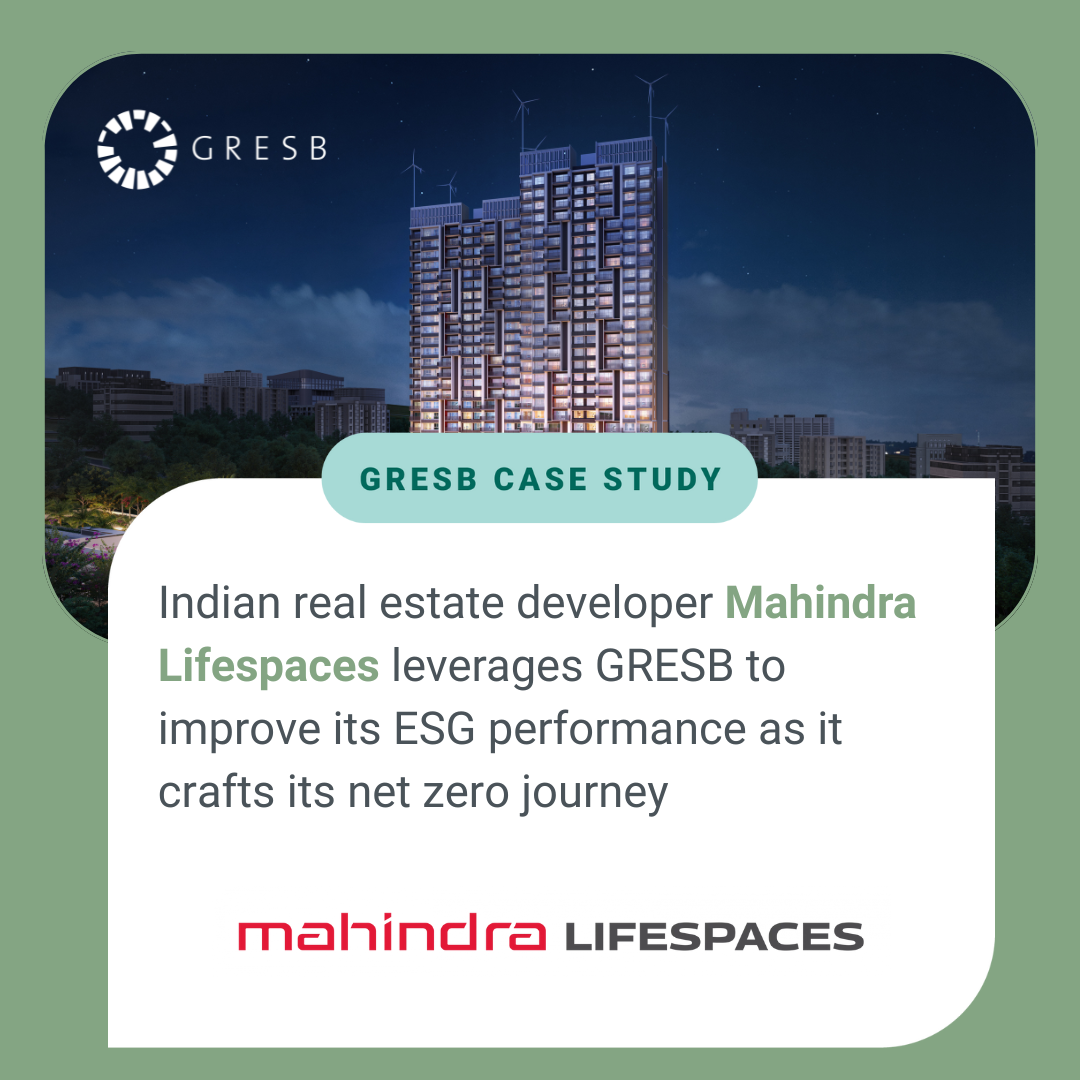Indian real estate developer Mahindra Lifespaces leverages GRESB to improve its ESG performance as it crafts its net zero journey
About Mahindra Lifespace Developers Limited
Mahindra Lifespaces develops thriving residential communities and enables business ecosystems through its premium residential projects, integrated cities, and industrial clusters.

Business type: Real estate developer
Region: India
Market capitalization: ~INR 72.2 billion (USD 885.8 million) as of September 30, 2022
Use of GRESB: GRESB Real Estate Assessments & Public Disclosure
Focus on ESG:
Mahindra Lifespaces is firmly on a path to net zero, which includes a number of commitments:
- Achieving net zero for all new developments by 2030
- Achieving carbon neutrality by 2040
- Helping the construction and building sector in India to decarbonize
Strengthening ESG practices
India-based real estate developer Mahindra Lifespaces started reporting to GRESB in 2015, but the company’s ESG journey began long before then when Mahindra Lifespaces became the first Indian real estate company to disclose its ESG performance and publish a sustainability report in 2011. Mahindra Lifespaces is now in its 11th year of ESG reporting and was recently recognized as a GRESB Sector Leader in the Global Residential category for developers in 2022.
Mahindra Lifespaces is continuously striving to improve its ESG practices and looks to the GRESB benchmark report as a means to identify data gaps and areas for improvement. Each year as soon as the report becomes available in the GRESB Portal, Mahindra Lifespaces launches an analysis to identify potential areas for improvement across three segments – Management, Performance, and Development. The results of the analysis are communicated to the company’s leadership and all relevant internal stakeholders along with a defined action plan for each improvement area with the ultimate goal of further strengthening and standardizing the company’s ESG practices. These action plans and improvements become part of the Mahindra Lifespaces’ overall ESG roadmap KPIs and targets.
One of the key areas where the GRESB benchmark has deeply helped Mahindra Lifespaces is strengthening the company’s ESG policies, such as their Green Supply Chain Management policy and their Sustainability policy. While Mahindra Lifespaces’ Green Supply Chain Management policy originally covered preference to local, low-carbon content and materials with recycled content, it was not very specific and clear when it came to VOC content, FSC certifications, and other requirements, even though these were already part of their procurement process. GRESB’s peer benchmarking helped Mahindra Lifespaces close this gap, strengthen the policy, and clearly communicate their procurement requirements to their suppliers.
“With a 100% green certified portfolio, transparent and clear communication of requirements in line with our sustainability commitments helps us better engage with our suppliers and integrate sustainability deeper into our value chain,” said Dr. Sunita Purushottam, Head of Sustainability at Mahindra Lifespaces.
“Our investors across business segments review our GRESB ESG performance as part of their ESG due diligence process. So, GRESB benchmarking is one of the important tools that could be utilized by a company in the construction and building sector to craft their ESG journey as it provides an opportunity to continuously improve vis-à-vis your peers,” she continued.
A journey to net zero
Since beginning its ESG journey in 2011, Mahindra Lifespaces’ strategy has shifted from reactive to proactive; while originally ESG disclosure began as a way to satisfy a regulatory requirement, it is now a means to attract investors and finance and to craft a better world. For this reason, Mahindra Lifespaces is fully committed to integrating ESG into all aspects of the business, products, and across the value chain.
Mahindra Lifespaces has also incorporated net zero into its strategy with a commitment to make all new developments net zero by 2030. Mahindra Lifespaces’ net-zero strategy involves a three-pronged approach which targets demand reduction through climate responsive design, use of efficiency measures, and integration of renewables. An example of Mahindra Lifespaces’ net zero efforts is the recent launch of Mahindra Eden, India’s first net-zero energy residential development in Bengaluru.
The developer also has approved science-based targets for Scope 1, 2, and 3 emissions for Residential, as well as for its Integrated Cities, aligned with the 1.5 degrees pathway. Additionally, Mahindra Lifespaces is also committed to achieving carbon neutrality by 2040.
Mahindra Lifespaces’ path to net zero involves the company’s supply chain partners, including suppliers, contractors, architects, and other stakeholders which is why Mahindra Lifespaces, alongside three partners, launched a business charter aimed towards decarbonization of the building and construction sector across the value chain in India. As of December 2022, 18 members from across the built environment stakeholder group have become signatories to the charter, which aims to achieve net zero across the sector.
“More and more investors are starting to realize that a company cannot be understood only through its financial performance. At Mahindra Lifespaces, increased investor scrutiny on ESG aspects has resulted in ESG audits, requests for ESG information, and environmental due diligence. Our robust ESG processes and reporting systems, which have been in place for more than a decade, have enabled us to provide timely responses to investor requests. As we continue on our journey to a sustainable future with environmentally and socially responsible homes and industrial developments, we will continue to join hands with all stakeholders in creating shared value for all,” concluded Dr. Purushottam.